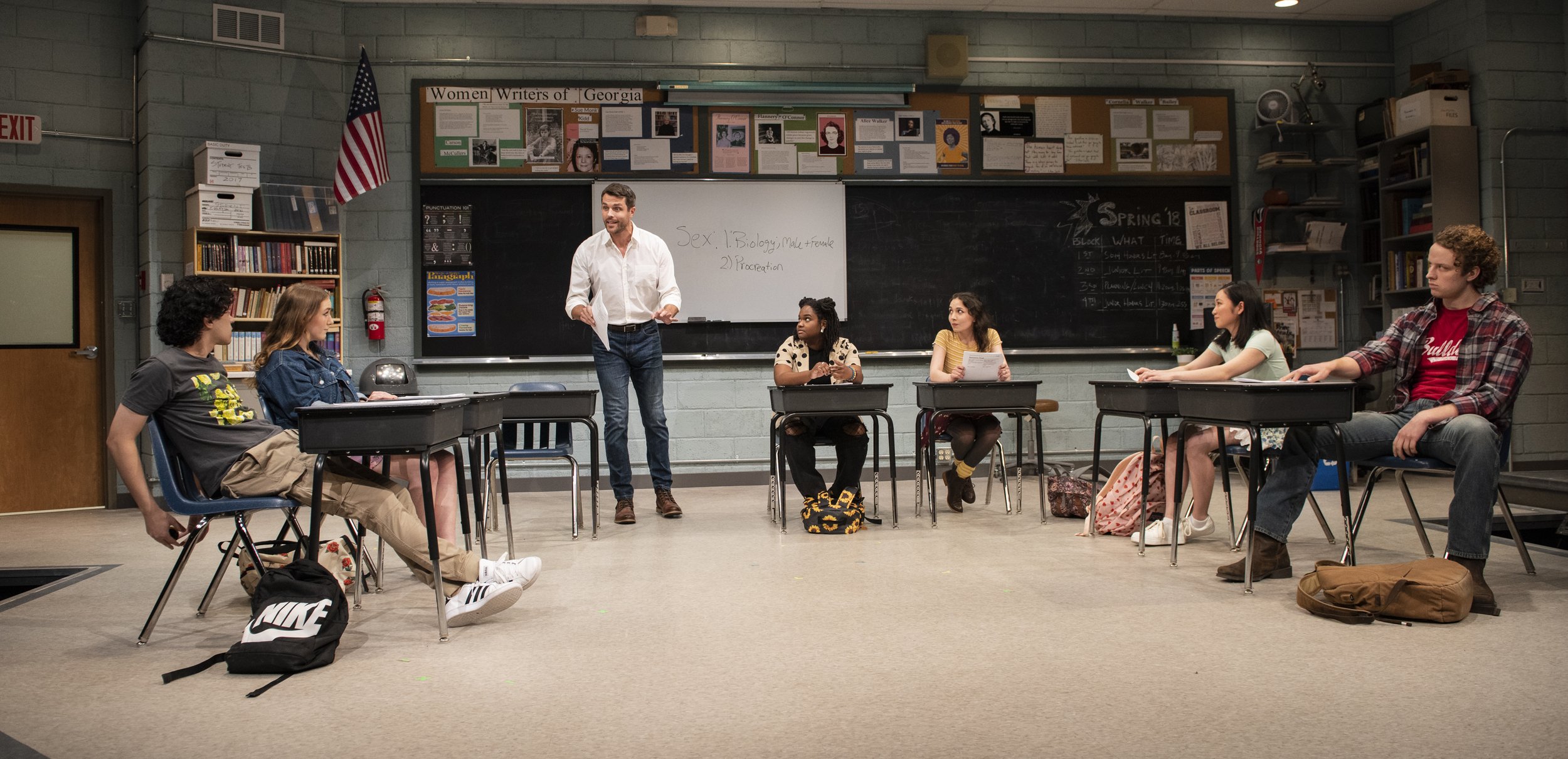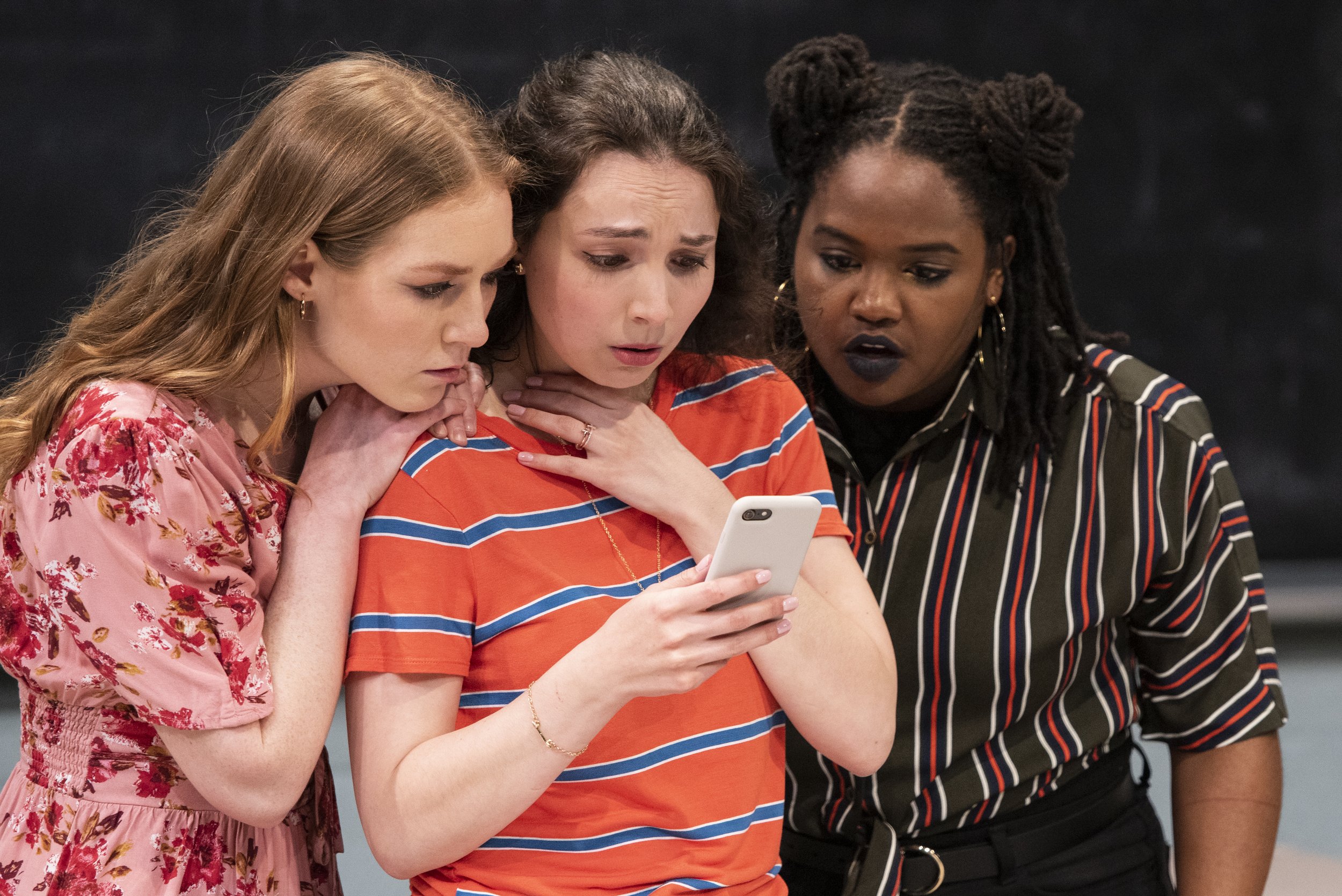A Rebellious New Take on the Modern American Drama
Kimberly Belflower’s John Proctor is the Villian at the Studio Theatre
Review by Melissa Lin Sturges
Studio Theatre’s production of John Proctor is the Villain does not reimagine femininity in the world of The Crucible. It confronts misogyny in the 21st Century head-on, and looks at the crucial lessons girls are taught about what it means to be “the perfect student.” Teenage rom-com tropes are nowhere to be found as these characters take their political surroundings seriously.
Set in 2018, the #MeToo movement pervades the air of the classroom and the characters in the play begin to push back on their experiences and personal accounts of what some might call a national “witchhunt.” With a fast-paced, laugh-out-loud script and beautiful direction by Marti Lyons, young actors shine as they tell a story of growing up, growing old, and surviving the trials of girlhood. The audience watches them try to learn what it truly means to be a feminist when everyone else says “no.”
Theater that centers on adolescent characters - or more specifically theater that is about “girlhood” - has gained significant traction in new playwriting over the last five or so years. Between Clare Barron’s off-broadway hit Dance Nation, Jocelyn Bioh’s School Girls, and the most recent young-adult musical at the Kennedy Center, C. Quintana and Janelle Lawrence’s Beastgirl, girlhood on stage is being reimagined and re-empowered.
After having directed The Wolves at Studio Theatre in 2018 (another quintessential play on contemporary girlhood) Marti Lyons returns to direct Kimberly Belflower’s timely and enticing script, John Proctor is the Villain. Proven time and again to be a skilled director of ensemble shows, Marti Lyons directs a play that is scenically straightforward. It never veers from reality. Yet, the play has enough nuance to tell us much more on stage than what is merely in the script.
Up and coming playwright, Kimberly Belflower was born and raised in small-town Appalachian Georgia, which the setting of this play fittingly parallels. Like Belflower must have, the female students in this play confront the patriarchal worlds of literature and high school. They push back on what it means to be a “great American playwright” and amplify those voices who aren’t heard. Though this play is not autobiographical, the experiences one has as a young girl may need to be processed differently at an older age. Even Belflower says in a separate review with Francesca Sabel, “I’m coming of age all the time.”
The script savagely unpacks Arthur Miller’s The Crucible, a text many high school students become familiar with at an early age. The play is often one used to introduce students to drama, McCarthyism, and to American literature as a whole. This production showcases the theatrical urges for young, usually female-identifying, students to engage with these dramas, to think about their own lives amidst patriarchy, and to challenge the status quo.
The production began in a class of five students and one male teacher. The introduction of a Feminist Club to this small town high school begins to rub PTA members the wrong way, but the female leads - Beth, Nell, Ivy, and Raelyn - are committed to this task. For a number of reasons, the Feminist Club exists to help the characters individually define and challenge their role in the classroom and beyond it.
Beth (Miranda Rizzolo) wants nothing more than to leave her small town behind and attend the most prestigious university she can - perhaps earning the attention of her English teacher, Mr. Smith (Dave Register) in the process. Nell (Deidre Staples) moved from Atlanta only a few months before the play begins, and is trying to figure out how her own experiences of Black girlhood will be answered. Ivy (Resa Mishina) supports her friends’ politics and loves their company, but loses trust when the tables turn on her father. Raelyn (Jordan Slattery) looks for answers after a double loss and a double betrayal- that of her ex-boyfriend, and that of her best friend. She later adds a betrayal in forgetting to value her own self as well.
The notable absence of former-student Shelby (Juliana Sass), begins to stir up rumor and suspicion. Teenage relationships fall apart before our eyes, and some begin to kindle a flame. At the root of conflict in John Proctor is the Villain, the “sensational” english teacher disconcertingly presses female characters with the discomfort and curiosity of their own intellectual and sexual comings-of-age. By the end of (Act 1), this coming-of-age assumes a much more sinister tone. A bold plot twist forces the audience to question: what are girls actually being taught; and who is going to believe them?
Featuring southern dialects and Gen Z lingo, the script contains natural banter and powerful monologues. Belflower commands the teenage language, indicating how crucial communication can be in these years. Or, how words can be meaningless or mean everything depending on who hears them. The actors do well with the fast-paced script. Even though the cast is entirely of adults, no teenage characters appear to “act young.” Rather they act as though they have one goal of surviving, yet still somehow enjoying their youth.
The performance featured snappy comedy, heartbreaking moments, and intense drama that kept a skilled cast on their feet, and an audience at the edge of their seats. While the script’s concept suggests that this play might be wordy, pedantic, or perhaps too “intellectual” to work, Lyons allows Belflower’s witty and intoxicating script to shine. The setting of an english literature classroom somewhere nondescript outside of Atlanta reminds the audience what it feels like to be confined to schedules, supervision, and censorship. Fluorescent-style lighting reinforces the pressures and stress of adolescence.
A rebellious new take on the modern American drama, John Proctor is the Villain presents “a tragedy of the everyday girl.” Exciting, poetic, and filled to the brim with Taylor Swift references, John Proctor challenges a literary hierarchy and asks us to take ourselves seriously, but never forget to release our inhibitions.
Run Time: 2 hours including one 15-minute intermission
Performances through June 12, 2022.
John Proctor is the Villain plays through June 12th at Studio Theatre - 1501 14th Street NW
Washington, DC 20005. For tickets, buy them at the door, call the box office at 202-332-3300 or purchase them online.
Melissa (she) is a scholar, educator, and practitioner of theatre and performance. She recently moved to DC after having lived and worked in New York and outside Philadelphia. She is a creative dramaturg and an advocate for adapting the written archive through performative writing.



